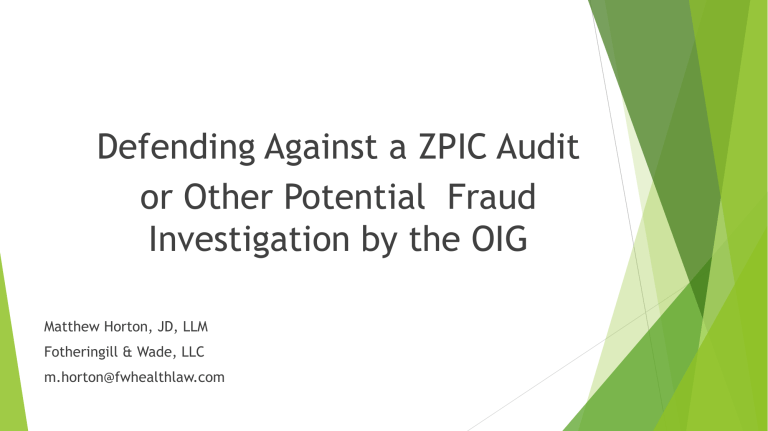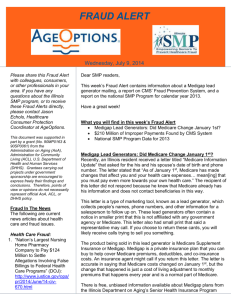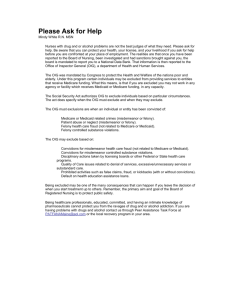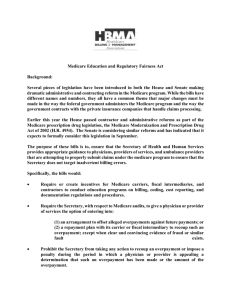
Defending Against a ZPIC Audit
or Other Potential Fraud
Investigation by the OIG
Matthew Horton, JD, LLM
Fotheringill & Wade, LLC
m.horton@fwhealthlaw.com
Objectives
1.
Fundamentals of the ZPIC Program.
2.
How to Respond to a ZPIC ADR & Denial.
3.
Case Study of ZPIC Audit.
CMS Financial Report: Fiscal Year 2014
“In 2026, the HI Trust Fund
will be exhausted
according to the
projections by the CMS
Office of the Actuary.
Under current law, when
the HI Trust Fund is
exhausted, full benefits
cannot be paid on a timely
basis”.
From the 2013 report.
Alphabet Soup of Auditors
CMS Financial Report: 2014
Program Integrity activities target the range of causes of
improper payments including errors, fraud, waste, and
abuse.
Medicare Program Integrity
Functions include the detection & deterrence of fraudulent billing
Accomplished through:
1.
Enhanced provider enrollment activities;
2.
Proactive data analysis;
3.
Close collaboration among law enforcement;
4.
Subject matter experts and program integrity contractors; and/or
5.
The investigation of complaints from various sources; provider on-site
visits; and beneficiary interviews.
What Is Medicare Fraud?
In general, fraud is defined as making false statements or representations
of material facts to obtain some benefit or payment for which no
entitlement would otherwise exist. These acts may be committed either
for the person’s own benefit or for the benefit of some other party.
Examples of Medicare fraud may include:
1.
Knowingly billing for services that were not furnished
and/or supplies not provided, including billing Medicare
for appointments that the patient failed to keep; and
2.
Knowingly altering claims forms and/or receipts to
receive a higher payment amount.
(See MPIM, Ch. 4, Sect. 4.2.1 for more examples)
What Is Medicare Abuse?
Practices that, either directly or indirectly, result in unnecessary costs to
the Medicare Program.
“Abuse appears quite similar to fraud except that it is not possible to
establish that abusive acts were committed knowingly, willfully, and
intentionally.”
Examples of Medicare abuse may include:
1.
Misusing codes on a claim
2.
Charging excessively for services or supplies
3.
Billing for services that were not medically necessary or services that do not meet
professionally recognized standards.
Both fraud and abuse can expose providers to criminal and civil liability.
Per Medicare Learning Network
“[T]here is no precise measure of health
care fraud…”
Fraud?
Abuse?
Improper Payment?
Reasonable Minds can Differ?
How far back can the OIG look?
A civil action under section 3730 may not be brought —
more than six years after the date on which the violation of
section 3729 is committed, or
more than three years after the date when facts material to the
right of action are known or reasonably should have been known
by the official of the United States charged with responsibility
to act in the circumstances, but in no event more than 10
years after the date on which the violation is committed,
whichever occurs last.
The Affordable Care Act
“An
overpayment must be reported and returned
[within 60 days].”
“Any
overpayment retained by a person after the
deadline . . . is an obligation” to repay under the False
Claims Act and can trigger liability under that Act’s
penalty provisions.
What qualifies as an overpayment?
The False Claims Act,
31 U.S.C. §§ 3729-3733
Knowingly submitting a false or fraudulent claim for
payment can lead to:
1.
Treble damages and
2.
Fines of $5000-$10,000 per claim
(current fines of $5,500 to $11,000)
In theory, a $1.00 error on 100 claims could expose
a provider to $1,000,000 in damages and fines.
ZPIC: Fraud-Fighting Specialists
HIPAA (1996) required Medicare to enlist dedicated
contractors to protect the integrity of Medicare’s
payments (had been FI responsibility).
The first fraud-fighting contractors were 18
geographically divided Program Safeguard
Contractors (PSC).
In 2008, Medicare replaced the PSC program with the
Zone Program Integrity Contractor program (ZPIC).
ZPIC: Setup
Zone Program Integrity
Contractors (ZPICs)
ZPICs identify target areas
based on:
ZPIC
Zone
Safeguard Services
1
California, Hawaii, Nevada, American Samoa,
Guam, and the Mariana Islands
AdvanceMed
2
Washington, Oregon, Idaho, Utah, Arizona,
Wyoming, Montana, N. Dakota, S. Dakota,
Nebraska, Kansas, Iowa, Missouri, Alaska
Cahaba
3
Minnesota, Wisconsin, Illinois, Indiana, Michigan,
Ohio, Kentucky
Health Integrity
4
Colorado, New Mexico, Texas, Oklahoma
5
Arkansas, Louisiana, Mississippi, Tennessee,
Alabama, Georgia, N. Carolina, S. Carolina,
Virginia, W. Virginia
Under Protest-PSCs
continue to
operate.
(Safeguard
Services)
6
Pennsylvania, New York, Delaware, Maryland,
D.C., New Jersey, Massachusetts, New
Hampshire, Vermont, Maine, Rhode Island,
Connecticut
Safeguard Services
7
Florida, Puerto Rico, Virgin Islands
•Investigations
•OIG and law
enforcement instructions
•Congressional mandates
•Data Mining or
“Predictive Modeling”
AdvanceMed
States in Zone
Program Safeguard Contractors
(PSCs) Operating in Maryland
SafeGuard Services PSC Contractor
for:
Part A and Part B
TriCenturion PSC Contractor for:
Durable Medical Equipment
Prosthetics
Orthotics
Supplies
ZPIC: Medical Review Function
When the PSC and the ZPIC BI units receive an allegation of fraud, or identify a potentially
fraudulent situation, they shall investigate to determine the facts and the magnitude of the
alleged fraud. They shall also conduct a variety of reviews to determine the appropriateness of
payments, even if there is no evidence of fraud. (MPIM, Chapter 4 Section 4.7)
Reactive
Referrals
from MACs, HHS OIG tipline, law enforcement,
whistleblowers
Proactive
Data-mining
across years of claims data
Fraud Prevention System (FPS)
CMS-operated
analytical and predictive tool
ZPIC: Investigating Potential Fraud
Medical record requests
Unlike
RACs, NO limit on volume of record requests
Beneficiary interviews
Staff interviews
Can
be under penalties of perjury
Right
to counsel
Site visits
Can
be unannounced
ZPIC: Recovery
When a ZPIC finds a claim that should be denied or recovered, it refers the
claim to the relevant MAC to process the denial or recovery.
In 2012, the GAO estimates ZPICs saved Medicare $252 million.
If a ZPIC suspects fraud, it must refer its investigation to law enforcement,
usually the HHS Office of the Inspector General or the FBI.
Civil and criminal penalties can result.
Restitution
Fines
Incarceration
ZPIC: Expanded Reach
A ZPIC can act claim-by-claim or at the wholeprovider level.
1.
Extrapolation
2.
Payment suspension
MAC
hands claims to ZPIC for review before
payment. This can last indefinitely.
3.
Revocation/deactivations
A
provider’s Medicare billing privileges are revoked or its
NPI deactivated
ZPIC: Extrapolation
Other reviewers—from MACs to HHS OIG—can use
extrapolation, but they are a key feature of the ZPIC
program.
The purpose of extrapolation is to save the administrative
costs that would be necessary to investigate each claim.
When a ZPIC finds what it believes is a “sustained or high
level of payment error,” it can use sampling and
extrapolation.
CMS
The
has not defined a sustained or high level.
determination of a sustained or high level of error is not
subject to judicial review.
ZPIC: Sampling Steps
Determining the period of review
Can range from days to years
No look-back limit
Defining the universe, sampling unit, and sampling frame
Universe is usually all claims in sampling period
Unit can be line items, claims, clusters of claims (by beneficiary, physician,
etc.)
Frame is list of all possible sampling units
Designing the sampling plan and selecting the sample
Selecting the kind of sampling to use (e.g. random, systematic, stratified)
Can use pretty much any methodology endorsed by CMS or employed by other
law enforcement agencies
ZPIC:
Hypothetical Sampling Results
Total Sample
Size
50
Total Universe
500
Sample Mean
Overpayment
$5,000.00
Point Estimate
$2,500,000.00
Lower Limit
$2,250,000.00
Billing Error
Rate
100%
Payment Error
Rate
100%
Responding to a ZPIC Audit
Assemble all medical records and other pertinent documentation.
Pre-payment reviews: Documents must be submitted within 45 days
Post-payment reviews: Documents must be submitted within 30 days
Review all relevant Medicare criteria and regulations
Have properly trained team and/or attorney evaluate the cases
The key skill is experience interpreting medical records in light of complex regulations & often
fuzzy criteria and formulating a clear, targeted response.
Ordinary denial management processes are likely under-prepared for the scope of a ZPIC audit
and under-skilled for what’s at stake.
You should consider retaining a lawyer.
Civil & criminal penalties for ZPIC period
Civil & criminal penalties under False Claims Act outside ZPIC period
Attorney client privilege
ZPIC Requirements
ZPICs have to:
Re-open claims for post-payment review
1.
Don’t need good cause within 1 year of initial determination
2.
Need good cause 1-4 years
Use a medical specialist for any denials “not based on the application of
clearly articulated policy with clearly articulated rationale”
MACs have to put recovery on hold if you appeal within 30 days
Ordinary appeals process applies to ZPIC denials
Redetermination, reconsideration, ALJ, Appeals Council, District Court
ZPIC: Case Study
PSC conducted proactive data analysis of small hospital.
In 2010, PSC sent written request for medical records associated with claim
sample.
In 2013, ZPIC sent 15 pg. “Post Payment Review Results & Overpayment
Determination” to CEO.
Alleged insufficient documentation to justify medical necessity
Denial premised on non-compliance with LCD’s detailed service and doc.
requirements
Extrapolation!
Universe of 500 claims
Sample of 50 claims, all denied post-payment
$250,000.00 at issue on sample claims
$2,250,000.00 “lower limit” (total estimate $2,500,000.00)
ZPIC: Case Study
Worked quickly to put recoupment on hold-within 30 days
Some issues getting MAC to comply
Worked closely with hospital and with treating physician
Developed arguments on both the audit process and the
claim details
Analyzed LCD at issue, applied it to facts of each claim
Attacked quality & promptness of notice
Sent appeals—one for each claim and one for the extrapolation
Wisconsin Physician Services (WPS) LCD L30159:
Cataract Surgery and Complex Cataract Surgery
ZPIC: Case Study
Of 50 denied claims:
93% favorable at redetermination
7% favorable at reconsideration
No decision on extrapolation arguments, but “0”
extrapolated is still “0.”
Key was understanding the LCD and linking it to specific
record details
Back up would be argument that LCD not binding on ALJ
ZPIC: Summary
ZPICs do have big hammers
Extrapolated denials
Payment suspension
Revocation
Prison
Do:
Prepare through avoidance.
Know the rules and follow them.
Document, document, document.
Respond quickly and thoroughly.
Don’t:
Panic, ignore, or lash out
Rely on normal audit processes. ZPIC is not a normal audit
What is a provider expected to know?
Know what you “should have known.”
CMS
presumes your knowledge of every word of every
statute, rule, NCD/LCD, manual, transmittal, etc.
Administrative Law Judge comment in an Unfavorable ALJ Decision:
“The
Provider was unquestionably aware of the CMS
regulations, manuals and rulings, CMS bulletins, past
unfavorable CMS contractor actions and the lack of
substantiating medical records. See 42 CFR Section
411.406(e) (knowledge presumed from experience and
constructive notice of CMS publications).”
Thank You For Your Attention!
Questions? Comments?
Matthew Horton
m.horton@fwhealthlaw.com
410-296-1552, ext. 169
Fotheringill & Wade, LLC
1 Olympic Place, Suite 500
Baltimore, Maryland 21204
800-704-5574
32
Please Take Note!
The information conveyed in this presentation is for general educational purposes and is not legal
advice. The application and impact of laws can vary widely, based on the specific facts involved.
Given the constantly changing nature of state and federal laws, there may be omissions or
inaccuracies in the information you receive during this program. Accordingly, any information is
provided with the understanding that the presenter is not rendering legal, accounting, or other
professional advice and services. As such, any information obtained in this presentation should not be
used as a substitute for consultation with legal counsel or other professional advisors specifically
retained for that purpose. While Fotheringill & Wade, LLC has made every attempt to ensure that the
information contained in these materials is generally useful for educational purposes, Fotheringill &
Wade, LLC, Washington & West, LLC, and its agents & employees are not responsible for any errors or
omissions or for the results obtained through the use of any information herein.
Copyright 2015 by Fotheringill & Wade, LLC. All rights reserved.







